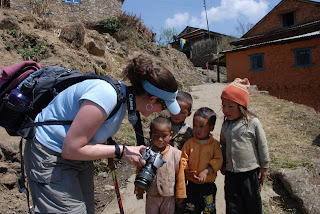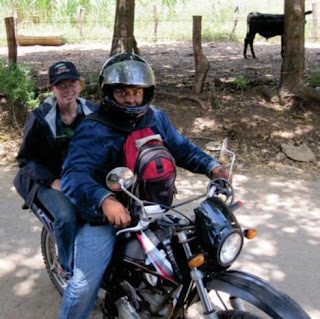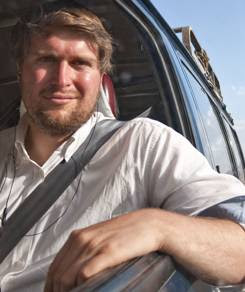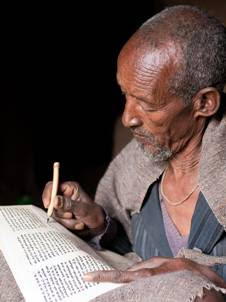 My Fulbright grant took me to Nepal, where I lived in Kathmandu and studied women’s reproductive health. I consider receiving a Fulbright U.S. Student Program grant one of my greatest achievements so far, and as cliché as it sounds, it really was the experience of a lifetime. I was fortunate enough to be there during one of the most historic times in Nepali history—when the monarchy was abolished and the Maoists were elected to a majority of the Parliament seats.
My Fulbright grant took me to Nepal, where I lived in Kathmandu and studied women’s reproductive health. I consider receiving a Fulbright U.S. Student Program grant one of my greatest achievements so far, and as cliché as it sounds, it really was the experience of a lifetime. I was fortunate enough to be there during one of the most historic times in Nepali history—when the monarchy was abolished and the Maoists were elected to a majority of the Parliament seats.
My research involved designing and pilot testing a sexual health education program for Nepali women. With the help of a Nepali research assistant, I first completed a series of interviews and focus groups with various women about their experiences and previous sex education. Based on the data gathered from these interviews, I then designed a program called Let’s Talk!, which taught women about basic sex education, STDs/HIV, proper male and female condom use, various forms of birth control and how to discuss using protection with one’s partner. The results were far more successful than I anticipated they would be, and I established what will be lifelong relationships with several people.
But undertaking a Fulbright grant in the developing world is not easy, nor was every day fun. To be perfectly honest, there were many days when I would have jumped on a plane and left had I been given the chance. Battling things like fuel shortages, 40 hours a week without electricity, pollution, a lack of hot water (or no water at all), and being paranoid that everything I put in my mouth contained parasites or bacteria made my fellowship challenging in ways that pushed me to my limits. To be a Fulbrighter in the developing world takes a whole other skill set that many people, including myself, could not have anticipated.
Nepali people are so kind in general and genuinely helpful that even when things were tough, I had a supportive community. I made close friends with Nepalis my age, was offered help with my research and was invited for tea and dhal bhaat (a traditional Nepali meal) on many occasions. I was treated just like a member of the family. When I was dealing with challenges and missing my support network back in the U.S., my Nepali family stepped in.
Reflecting upon my time in Nepal, I now realize that even though it was occasionally a challenging experience—perhaps the hardest experience of my life—it was also one of the most valuable. I now appreciate more of the little things I took for granted in my life back in the U.S. (clean water, reliable transportation, sanitation, and uninterrupted electricity). And I find that I have a better understanding and deeper level of empathy for the way most of the rest of the world lives. But most importantly, I understand how important family and close friends are in getting through trying times. Living among Nepali people taught me that as long as you have that support, everything else is tik chha—Okay.
My advice to those pursuing a Fulbright grant in the developing world is threefold. First, keep in mind as you apply for the fellowship, additional challenges will exist. The experience of a Fulbrighter in France will be far different from that of a Fulbrighter in say, Uganda, simply because of the additional challenges of meeting your basic needs. While a Fulbrighter in these two countries will have similar experiences in terms of adjusting to cultural differences and perhaps the language barrier, the additional adjustment of going from the developed world to the developing will be tough.
Second, when you get to your host country, take the time to immerse yourself in the local community and find a support network. Having a “family” in your host country will be your most valuable asset. Also, find other foreigners, whether they be other Fulbrighters, expatriates, or Embassy staff. Having a community of people to talk to as you go through the adjustment process will make it much smoother. When you can laugh together about picking up intestinal bacteria, it makes it easier to handle!
And finally, go with a sense of humor. Leave behind your need for control. I found that the best way to cope with the adjustment to a different culture, environment and way of life required accepting the fact that most of what was happening around me was completely out of my hands. And when I could laugh about it, laugh at myself and how I reacted in the situations, I was better able to cope. This was probably the biggest change I saw in myself as a result of my Fulbright experience and it was for the best.
My time in Nepal as a Fulbrighter will continue to transform me and my research—perhaps for years to come. I continue to be in close contact with my Nepali family and look forward to visiting them again in the near future. Although it challenged me and pushed my limits in many ways, I would never trade the experience for anything.
Photo: Michelle R. Kaufman, 2007-2008, Nepal, shows a group of rural Nepali children a digital photo of themselves on the trail to Nagarkot.







